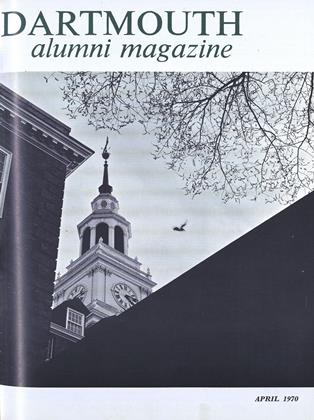By Prof. Peter Saccio (English).Princeton, N.J.: Princeton UniversityPress, 1969. 233 pp. $6.95.
This is the kind of book which, if President Kemeny has his way, Dartmouth Ph.D. candidates in English will soon be writing. Because such books will not be widely read, their publication will have to be subsidized, and Dartmouth Publications, a small but distinctive operation, will have to become The Dartmouth College (University?) Press and much less distinctive. This book's preface is subscribed "Sanborn House, Dartmouth College," a close-home augury.
The book is subtitled "A Study in Allegorical Dramaturgy," and Dr. Saccio tries to show what that means and how it works or is worked in the plays of John Lyly (1554-1606). These filled a space in the history of the drama between medievalism and the flowering of the popular theatre in Shakespeare, Marlowe, Jonson. They were acted by schoolboys before a very select audience: Queen Elizabeth and her courtiers. They were performed at the Blackfriars Theatre, later reconstructed for Shakespeare's company. Dr. Saccio gives an interesting, clear, and convincing description of the staging there, quite unlike the staging supposed in, say, the Shakespeare Theatre in the Folger Library in Washington.
How many performances Lyly's plays had is not known; we can be sure of only one for each play. But they were published and became known even if they were not seen. But they seem too strange, too undramatic, to have had much impact upon dramatic history. They lack plot and action; characters are only faintly delineated; they are too clearly the work of a richly talented writer who was not a great dramatist. They mix gods and mortals, both characterized one-dimensionally. They qualify as comedies by happy endings, an air of fantasy, occasional refined slapstick. They exhibit undoubtedly a peculiar dramaturgy, worthy of being differentiated. But is "allegorical" the word to do it?
Dr. Saccio derives the word from recent investigations of the nature of Renaissance allegory, especially in Spenser, a very debate allegorist. Was Lyly a deliberate allegorist? I regret I can't find that he was. an unconscious allegorist? Dr. Saccio's book works learnedly and subtly and variously to persuade that he was. But my doubts persist.
Mr. Pressey is Willard Professor of Rhetoricand Oratory Emeritus.
 View Full Issue
View Full Issue
More From This Issue
-
 Feature
FeatureThe Dilemma of World Power
April 1970 By GENE M. LYONS, -
 Feature
FeatureRevival of the M.D. Degree
April 1970 -
 Feature
FeatureTHE KEMENY INAUGURATION
April 1970 -
 Feature
FeatureThe National Scene
April 1970 -
 Article
ArticleThe Faculty
April 1970 By WILLIAM R. MEYER -
 Class Notes
Class Notes1935
April 1970 By RICHARD K. MONTGOMERY, GEORGE PRICE
Books
-
 Books
BooksPIT BULL.
FEBRUARY 1968 By BROWNLEE McKEE -
 Books
BooksSplendor
MARCH, 1928 By H. B. Preston '05 -
 Books
BooksTHE STORY OF SAN MICHELE
January, 1930 By H. E. West -
 Books
BooksTHE HOLY SLICE.
February 1974 By H. KARL LUTGE -
 Books
BooksTHE IVY LEAGUE TODAY.
December 1961 By HERBERT F. WEST '22 -
 Books
BooksTHE PSYCHOLOGY OF SOCIAL MOVEMENTS
December 1941 By Irving F. Bender


